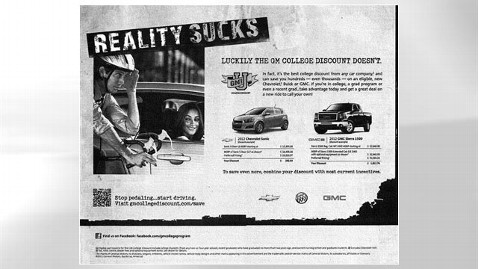GM Backpedals on Anti-Cycling Ad

GM
General Motors has done some backpedaling after one of its new ads, which touts driving GM cars as a superior alternative to cycling, caused outrage across the Internet and on college campuses.
The offending ad, which is running in college newspapers throughout the country, features a young man struggling on a bicycle and shielding his face in embarrassment from a young woman who looks on comfortably from her (presumably GM) car. The image sits under banner text that reads, “Reality Sucks.”
Next to that banner text, the ad states, “luckily the GM College Discount doesn’t.” The campaign’s tagline reads “Stop pedaling … Start driving.”
Featuring the ads in college newspapers might have seemed like a great idea at GM, considering the nature of the discount the company is offering. But the company seemed to forget that college campuses are a hotbed of cycling enthusiasts, many of whom aren’t too keen on car culture, or General Motors.
One professor at UCLA sent the ad to the editors of the website Bike Portland, who, in turn, published the harsh comments that GM might not want to hear.
“GM, the company that required us taxpayers to bail it out in 2009, is now biting the young people who bear and will bear the environment and health damage of its gas swilling ways,” the professor wrote. “While every driver in LA knows that the reality which truly “sucks” is the grid-locked, car-loaded, obesity-enhancing, stress-generating car-toxicity of simple commuting in this region.”
And it wasn’t just academics who were upset, with many cyclists taking to the Web to voice their complaints.
“Yes, GM has decided that it’s okay to make college students feel ashamed for riding bikes, a choice that’s almost certainly better for themselves, their schools and their communities … The ads suck, but I don’t need to tell you that,” blogger Alissa Walker wrote.
Soon, Twitter reposting of the email addresses of Selim Bingol, vice president global communications at GM, and Mark L. Reuss, GM’s president became a trend among those peeved with the ad.
The company seemed to have realized the error of its ways quickly. Since Oct. 11, GM’s Twitter feed has been a stream of apologies to other Twitter users who have voiced their anger and distaste.
At least the company seems to be grabbing the attention of some of the right people. Cyclist Lance Armstrong recently retweeted a GM announcement: “Wanted to let you know we have been listening to the community and decided to pull the ad from our rotation.”